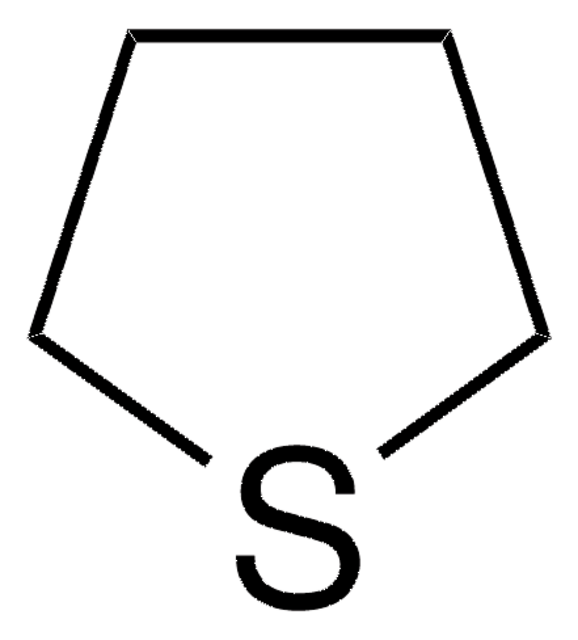T22209
Sulfolane
99%
Synonyme(s) :
Tétrahydrothiophène 1,1-dioxyde
About This Item
Produits recommandés
Densité de vapeur
4.2 (vs air)
Niveau de qualité
Pression de vapeur
0.01 mmHg ( 20 °C)
Pureté
99%
Indice de réfraction
n20/D 1.484 (lit.)
Point d'ébullition
104 °C/0.2 mmHg (lit.)
285 °C (lit.)
Pf
20-26 °C (lit.)
Densité
1.261 g/mL at 25 °C (lit.)
Chaîne SMILES
O=S1(=O)CCCC1
InChI
1S/C4H8O2S/c5-7(6)3-1-2-4-7/h1-4H2
Clé InChI
HXJUTPCZVOIRIF-UHFFFAOYSA-N
Vous recherchez des produits similaires ? Visite Guide de comparaison des produits
Application
Mention d'avertissement
Danger
Mentions de danger
Conseils de prudence
Classification des risques
Acute Tox. 4 Oral - Repr. 1B
Code de la classe de stockage
6.1C - Combustible acute toxic Cat.3 / toxic compounds or compounds which causing chronic effects
Classe de danger pour l'eau (WGK)
WGK 1
Point d'éclair (°F)
350.6 °F - closed cup
Point d'éclair (°C)
177 °C - closed cup
Équipement de protection individuelle
dust mask type N95 (US), Eyeshields, Gloves
Faites votre choix parmi les versions les plus récentes :
Déjà en possession de ce produit ?
Retrouvez la documentation relative aux produits que vous avez récemment achetés dans la Bibliothèque de documents.
Les clients ont également consulté
Notre équipe de scientifiques dispose d'une expérience dans tous les secteurs de la recherche, notamment en sciences de la vie, science des matériaux, synthèse chimique, chromatographie, analyse et dans de nombreux autres domaines..
Contacter notre Service technique














